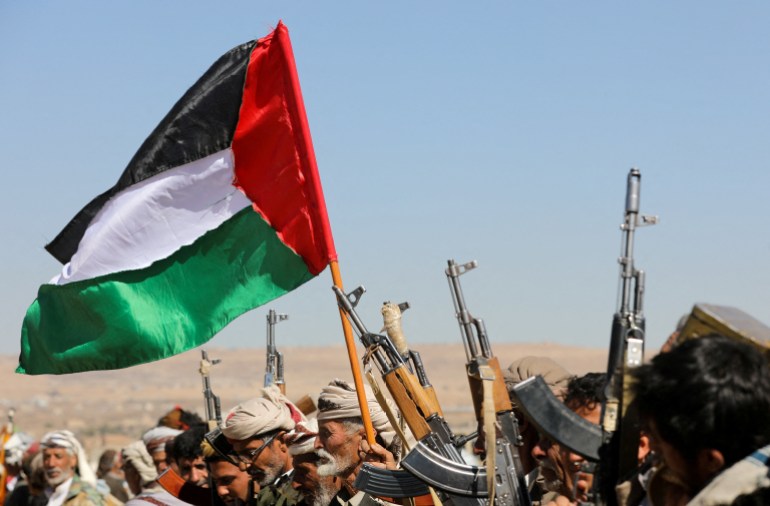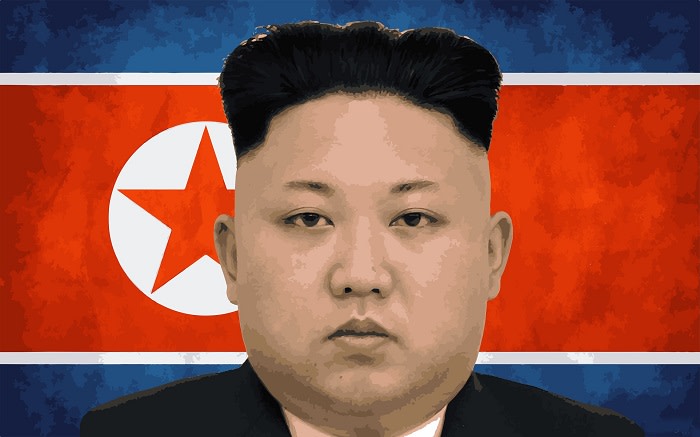Beirut, Lebanon – In the Red Sea, Yemen’s Houthi group continues to attack Israeli-linked ships supporting the people of Gaza, vowing to continue until Israel stops its relentless assault on the captive population.
Internationally, the Red Sea attacks have made headlines, not least because of the commitment they show to the Palestinian cause and the Houthis’ willingness to take action.
“The Houthis will not stop what they are doing until the Israeli offensive in Gaza is complete,” Eurasia Group analyst Gregory Brew told Al Jazeera.
Consolidating their domestic presence
The Houthi rebel group, which seized the capital Sanaa in 2014, still faces an internationally recognized Yemeni government represented by a Presidential Leadership Council (PLC) of Saudi- and Emirati-backed forces.
Domestically, analysts believe the Houthis are seeking to finalize control of a strategic location that could dramatically expand their influence in Yemen and strengthen their ambitions as a regional player: Marib.
Marib is a region rich in natural resources, especially oil and gas. Located about two hours east of Sanaa, it is strategically located near other oil-producing regions controlled by UAE-backed militias that oppose the Houthis.
In recent weeks, Yemeni analysts have seen reports of a Houthis establishing a troop presence near Marib, although it is difficult to say to what extent, and that small clashes have occurred periodically in the area.
Marib is “one of the most strategic points in Yemen,” Yemen analyst Nick Brumfield told Al Jazeera.
“If the Houthis are really trying to take it… not only are they in a good position to try to take Marib, they also have perfect insight into the Shabwah and the split of southern Yemen in two.”
In 1990, the People’s Democratic Republic of Yemen (South Yemen) united with the Yemen Arab Republic (North Yemen). While the country has since been united, some factions – including groups in the PLC – harbor strong secessionist ambitions for the south. In other areas, different tribes rule.
Former Yemeni President Ali Abdullah Saleh once said that the government of Yemen was “like dancing on snake heads.”
“A red line that the Houthis must not cross”
“The Marib front is one of the fronts that has flared up from time to time since the UN ceasefire was declared in April 2022,” Faozi al-Goidi, junior visiting fellow at the Middle East Council on Global Affairs, told Al Jazeera.
The Houthis already control about 12 of 14 districts in Marib governorate. But the two main districts, al-Wadi and Marib City, are controlled by the al-Islah party, the offshoot of the Muslim Brotherhood that is part of the internationally recognized government. Al-Wadi in particular is home to an important oil field that the Houthis want to control, analysts said.
“The Houthis are eager, if not desperate, to seize Marib’s oil resources and revenues,” Hannah Porter, an independent Yemen analyst, told Al Jazeera. “If the Houthis take Marib, they would effectively control all key areas in northern Yemen and become much more economically powerful.”

It is unclear whether the Houthis are planning another offensive against Marib. They have made repeated attempts to take Marib in recent years, but each attempt has been repelled with heavy losses for Houthi forces.
“Marib was seen as a red line that the Houthis could not cross,” Porter said.
Capturing Marib would not only expand the Houthis’ economic opportunities but also deal a serious blow to the internationally recognized government.
“If the Houthis manage to fully capture Marib, it would reduce the presence of the internationally recognized government and Islah to just a few small areas, namely Taiz and Wadi Hadramout,” said Raiman al-Hamdani, a Yemen researcher at ARK Group.
“This will also undermine the credibility of the internationally recognized government and negatively impact its negotiating position and local support.”
After a bitter civil war that has lasted nearly a decade, the Houthis and Saudi Arabia are currently negotiating a ceasefire. Both appeared committed to an agreement, with analysts saying the Houthis’ actions in the Red Sea and domestically were part of a strategy to negotiate better terms.
In recent months, the Houthis have benefited from widespread recruitment campaigns as their attacks on ships they say are linked to Israel become increasingly popular.
Analysts said it was unclear whether retaliatory U.S. strikes or attacks on U.S. and U.K. warships had further galvanized support for the Houthis, but the group continued to gather crowds — reportedly numbering in the millions — at rallies on Friday. Many of these recruits joined the fight against Israel, but the Houthis were able to use them to bolster their forces stationed in Yemen.
Meanwhile, the Saudis have grown weary of military confrontation with the Houthis after entering Yemen’s civil war alongside the internationally recognized government in 2015. Currently, the Saudis appear committed to ceasefire negotiations with the Houthis, as a ceasefire was announced in April 2022.
“Saudi Arabia is committed to achieving calm and ceasefire in Yemen, but the events of the Al-Aqsa flood operation and the Gaza war delayed the signing process,” al-Goidi said.
US and British raids are “militarily useless”
As tensions rise around a possible offensive in Marib, attacks on the Red Sea remain in the international focus.
Houthi forces said Wednesday that they had fired multiple missiles at a U.S. destroyer, the USS Greeley, and would continue to attack U.S. and British warships in the Red Sea until the U.S.-backed Israeli war on Gaza ends.

The USA and Great Britain started a series of air strikes in January at Houthi targets, but their deterrence attempts have had little effect as the Houthis continue to disrupt shipping traffic through the Red Sea that they believe is linked to Israel.
“Most of the targets hit by the American attacks are targets that have been repeatedly bombed over the course of the war years, so they are militarily useless,” al-Goidi said.
“The only advantage [for the US] It is possible that some of the attacks stopped or, say, reduced the Houthi group’s ballistic attacks on ships, as ballistic missile platforms were bombed before they were launched.
“As the US Department of Defense says, the remaining raids on the ground have no impact,” al-Goidi said. “If America escalates its attacks, it could start the Yemen war all over again.”






Recent Comments